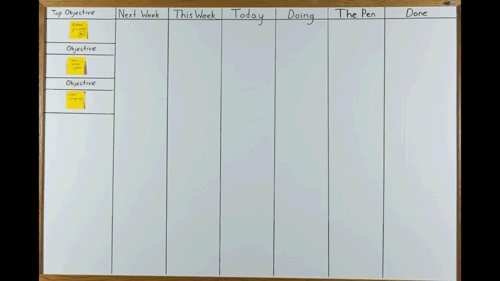A Lean work management system allows you to do more of the right work faster by visualizing and optimizing the flow work in your company.
Have you been in a situation where you had 20 priorities and no matter how hard you worked, none of them seemed to get done? Does it seem like it takes too long to get anything done? Do you know what your team is working on? By creating a Lean work management system, you and your team will be able to get more of the right work done faster.
Prep Your Board
To get started, gather your team around a large whiteboard. Mark the board with seven columns. Make three smaller boxes in the far left column to hold your key objectives for the week.
Post your top three objectives, derived from the Strategy worksheet, in the boxes.
Now, label the remaining columns(left to right), Next Week, This Week, Today, Doing, The Pen, and Done. All the labels should be obvious, except for The Pen. The Pen is for items that you are blocked by something out of your control. You’re either waiting for an email reply, waiting for a bug fix, or something else.

Fill Your Backlog
Begin to fill next week and this week with items you need to get done that are aligned with your top objectives. This area is called your backlog and represents the work you expect to complete this week, and may complete next week.
After a few cycles you will have data about how much work you can complete each week. Once you know that, you will have an estimate about how much work to sequence for each week. If you don’t know how much you can get done, take a guess for now and replace that guess with data over the next few weeks.

Review During Standups
During your daily standup, review the board from right to left. First review what moved into the done column yesterday. Then go through The Pen and see if anyone can help move one of those stickies forward. Next, review Doing and see what can be done to move those stickies to Done as soon as possible. Then arrange the Today column with the work you plan to get done as a team today. Finally, review the backlog to confirm Today’s work is appropriate. As work moves into Today, have the team member put his/her name on the sticky to show ownership.

Maintain Discipline
As you move work forward, update those stickies on the board. It’s critical to work on as few things at once as possible. To help with this, put limits on the This Week, Today, Doing, and The Pen columns. As you approach a limit in the column it will motivate you to finish work before starting new work.